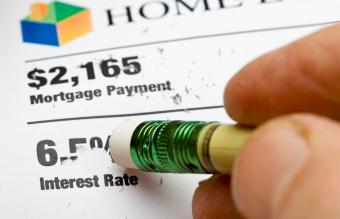
Whether you're in the market to buy a farm property or you already own a farm and need funds for running or expanding your operation, there are mortgage loan programs specifically designed for your purposes. As is the case with any major financing decision, farm mortgages have several different factors you can consider and need to know about before signing on the dotted line of the promissory note.
Buying or Refinancing a Farm
The primary difference between a traditional mortgage and a farm mortgage is the property itself. While traditional mortgages allow for the purchase or refinance of a residential property, farm financing is specifically for properties that are zoned agriculturally. In other words, the property has to involve the production of agricultural products, such as growing fruits and vegetables or raising livestock.
Interest Rates
Interest rates for farm mortgages have their own secondary market that differs from standard residential mortgage rates. Commercial banks price agricultural loans according to the federal funds rate and the deposit rate. In this regard, pricing is the same as residential mortgages. Instead of pricing through Fannie Mae, however, farm loans are priced through Farmer Mac.
Loans priced through the Farm Credit system are based on bonds issued by the Farm Credit Funding Corporation. The pricing of these bonds tends to be a couple basis points above the Treasury notes that are of equal term to the bonds. The bonds are considered to be risk-free because they are guaranteed or backed by a government-sponsored entity (GSE).
Tax Considerations
When it comes to deducting the mortgage interest, the tax considerations for a farm are the same as that for a residence. Generally, you can deduct all of the interest you pay as a portion of your mortgage payment. You should seek the advice of a tax professional to assess your personal tax deduction and implications.
Where there is a difference is if the mortgaged property is classified as a "working farm." If it is a working farm, the farm is classified as a business. For tax purposes, the mortgage interest is deductible as a business expense. The residence on farm land deducts its mortgage interest on Schedule A of the 1040, while the working part of the farm is deducted on Schedule F.
Security for the Loan
Farm property or the farmland itself both act as collateral for the mortgage or loan. If the borrower defaults on the loan, the lender has the right to foreclose upon the property that is up as collateral for the loan.
Down Payment Requirements
Down payment requirements on mortgages for purchasing a farm can vary by the lender. Down payments can be as little as 15% down. Other farm mortgages only finance up to 50% of the purchase price.
The same loan-to-values apply to a refinance of a farm mortgage. Owners who want to refinance are eligible to refinance a mortgage up to 85% of the market value of the farm or 50% of the farm, depending on the program the borrower chooses.
The USDA Farm Service Agency offers down payment assistant programs for beginning farmers. The program loans the money a farmer would need for the down payment on a purchase of a farm. The program offers farmers up to 40% of the down payment amount they need. It is a loan, so the farmer is still responsible for paying back the down payment loan.
Eligibility Requirements
Obtaining mortgage financing to buy or refinance a farm has its own set of eligibility requirements. Primarily, the lender requires that the borrower has enough experience working on and running a farm or agricultural property to justify a loan. For example, the lender can ask if the potential borrower has experience working on a farm or running the business operations of a farm for the last three out of 10 years.
Lenders also require a good credit history. Borrowers have to show that they pay their bills on time. If bills are late or delinquent, the borrower has to be able to show that this is due to a financial hardship or circumstances that are beyond his or her control.
Farm Mortgage Loan Programs
Several agencies exist to assist farmers in obtaining the mortgage financing they need to purchase and refinance their agricultural properties.
Farm Service Agency
The Farm Service Agency (FSA) is a part of the USDA, the United States Department of Agricultural. The FSA offers loan programs to farmers that are unable to obtain personal or commercial loans for:
- Purchasing farmland
- Constructing and repairing buildings on agricultural property
- Farm improvements
The FSA offers loans that are guaranteed and are direct loans to the borrower. Guaranteed loans provide the lender with a guarantee of repayment of 95% of the loan amount if the borrower defaults on the loan. These kinds of guarantees help borrowers because it makes lending more attractive to the lenders.
The Federal Agricultural Mortgage Corporation
The Federal Agricultural Mortgage Corporation is also known as Farmer Mac. Congress created Farmer Mac as a secondary market for farm mortgages. In order to accomplish its goal, Farmer Mac offers three loans programs, which are Farmer Mac I, Farmer Mac II and Rural Utilities. Farmer Mac is not a direct lender. It offers its programs through various lenders around the country.
Traditional Banks and Credit Unions
Some traditional banks and credit unions offer farm loans. While these financial institutions offer Farmer Mac programs, they also have mortgage programs that are their own offering for financing farm properties.
Generally, the banks and credit unions that tend to offer these programs are those located in farming and agricultural communities. For example, Farm Credit is a financial institution that offers agricultural loans in states such as Kansas, Tennessee and Ohio. The terms and conditions for these loans vary by institution, so it is best to contact the financial institution that services the area where the property is being financed.
Financing a Farm Is a Little Different...
Buying and running an agricultural property, such as a farm, is a unique type of property ownership. While it has some similarities to buying a residential home, there are differences when it comes to funding the purchase or refinance of a farm property. Understanding and working through these differences is the first step in establishing a farm mortgage.







